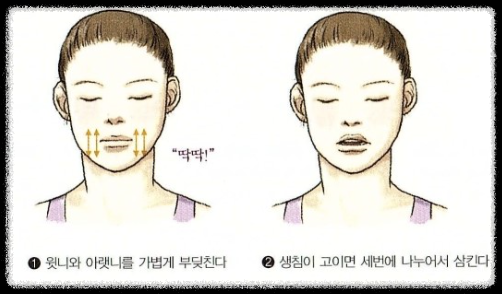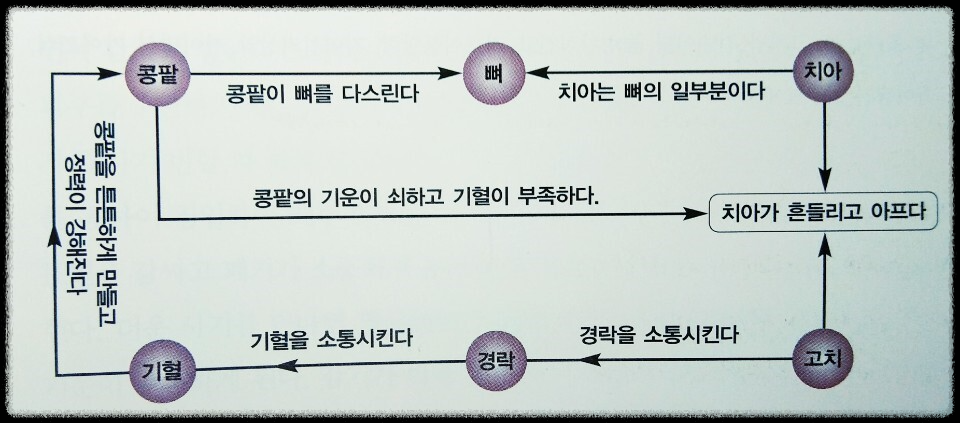《양성서》에,
"사람들이 수양하고 섭생하는 도(道)에는 각각 그 방법이 있다.
그 대요는 정(精)을 손상시키거나 기(氣)를 소모하거나 신(神)을 상하게 하지 않는 것이다.
이 3가지가 도가(道家)에서 말하는 정(精)을 보전하고 기(氣)를 보전하고 신(神)을 보전한다는 것이다.

매일 아침 첫닭이 울 때 일어나 앉아
이불을 두른 채로 호흡을 조절하고 치아를 맞부딪쳐[고치叩齒] 신(神-생각)을 모은다.
한참을 이렇게 하여 신기(神氣)가 안정된 후, 화후(火候)를 시행하여 수십 번 반운(搬運)하면
곧 몸 전체가 화창하고 혈맥이 저절로 흘러가는 것을 느낀다.
이러한 때에 입에서 침이 생겨 신기(神氣)가 가득 차면,
곧 입안에서 크게 돌려 삼킨 후에 단전으로 들여보내 원양(元陽)을 보한다.
반운(搬運)이 끝나면 평소에 보양하는 약을 먹고,
양 손을 문질러 열이 나게 한 후에 도인(導引)을 한다.
도인을 마치면 머리 빗고 양치하고 세수를 한 후에
향을 피우고 통장(洞章)을 한 번 묵송한 뒤 정원을 백 보쯤 산책한다.
해가 3-5길 정도 올라오면 죽을 먹는 데, 다 먹고 나면 손으로 배를 문지르며 이삼백 보를 걷는다.
이것이 양생(養生)의 대략이니 반드시 알아야만 한다"고 하였다.

《태식론》에,
"복식(服食)은 다음과 같이 한다.
한밤중 자시(子時)에 눈을 감고 동쪽을 향하여 정좌하고
뱃속의 묵은 기를 2-3번 불어내고는 숨을 멈추었다가 곧 콧속으로 몇 모금의 맑은 공기를 약간 들이마신다.
혀 밑에는 두 개의 혈(穴)이 있는데 신(腎)과 통하는 구멍이다.
혀를 입천장에 대고 잠시 숨을 멈추고 있으면 진액이 저절로 나온다.
이것을 입에 가득 채워 헹군 다음 서서히 삼키면 저절로 오장으로 들어간다.
이것은 기(氣)가 단전으로 돌아가는 것이다.
자시와 축시 사이에 하는 것이 좋은데 여의치 않으면 인시가 되기 전에 해도 된다.
자세는 누워서 하는 것도 괜찮다"고 하였다.
또, "사람이 늘 옥천(玉泉)을 마시면 오래 살고 얼굴에서 빛이 나는데 옥천이란 입 속에 있는 침이다.
닭이 울 때, 이른 새벽, 해가 뜰 때, 정오가 다가올 때, 정오, 오후, 해가 질 때, 황혼 무렵, 자정 등 하루에 9번씩 입을 헹구어 삼킨다"고 하였다.
구선이, "한(漢)나라의 괴경은 120세에도 기력이 매우 성하였다.
아침마다 침을 삼키고, 14번씩 치아를 맞부딪쳤다고 한다. 이를 연정(鍊精)이라 한다.
또한 두경승과 왕진상은 침으로 입을 헹구어 삼켰는데 이를 태식(胎息)이라고 한다"고 하였다.
도인법(導引法)
도인(導引)은 도교의 수행법 중 하나입니다. 도인은 신체를 굴신(屈伸)하거나 마찰하거나 하여 혈액의 순환을 좋게 하는 안마 · 체조라고도 불리는 건강법입니다. 조식(調息)과 병용하는데, 탁한 기(氣)를 체외로 배출하고 원기(元氣)를 체내에 저장하는 수행법을 뜻합니다.
고치법(叩齒法)
윗니와 아랫니를 마주쳐서 이를 튼튼하게 하는 방법입니다.
① 아침에 일어나 눈을 감은 후 고치를 하되 횟수는 보통 30회 정도 하는 것이 좋다.
② 혀를 상하 잇몸, 치아에 붙이고 몇 번 휘둘러준다. 이렇게 하여 침이 생기면 삼키지 말고 계속하여 혀로 양치질 하듯 휘저어 침이 점차 많아지면 약 3회에 나누어 삼킨다.
③ 아픈 치아 쪽을 더 많이 양치질하고 마지막에 3회에 나누어 삼킨다. 문제가 있는 치아 부위가 개운하지 않을 경우에 여러 번 양치질 할 수 있다.
④ 고치, 혀 휘두르기, 양치질, 침 삼키기의 순서로 반복하여 3회 진행한다.
매일 꾸준히 고치법을 행한다면, 전신이 건강해지고, 구강과 치아 전체 그 주위 조직이 건강해지며, 치아의 저항력이 전면적으로 높아져, 치아가 더욱 튼튼하고 정연하며 하얗게 됩니다.
[搬運服食]
[Movement and Diet]
養性書曰, 凡人修養攝生之道, 各有其法. 大槪勿要損精耗氣傷神. 此三者, 道家謂之全精全氣全神是也.
It is said in the Book of Nurturing the Spirit (養性書): "There are specific ways in Tao of training and preserving one's health. The point is not to harm the essence, qi, or the kidneys. Preserving the essence, qi, and spirit are the three that Taoism emphasizes.
每於雞鳴時, 便可起坐, 擁衾調息, 叩齒聚神, 良久, 神氣旣定, 方行火候搬運數十遍, 便覺渾身和暢, 血脉自然流通. 當此之時, 華池水生, 神氣滿谷, 便當大漱嚥下, 納入丹田, 以補元陽. 如搬運了, 就喫平昔補養的藥餌, 以兩手摩擦令熱, 乃行導引之法. 行畢, 方可櫛漱盥洗, 乃焚香黙誦洞章一遍, 逍遙步庭, 約行百步. 待日高三五丈, 方可食粥. 食畢, 以手捫腹, 行二三百步, 此養生大略, 不可不知.
Wake up with the first crow of the rooster, sit with the blanket wrapped around the body, control the breathing, click the teeth together, and eventually gather the spirit together. Do this for a while to stabilize the spirit qi; after this, practice a method of controlling Fire and movement for scores of times. Soon the body would feel clear and the blood vessels would be felt to flow smoothly. When the saliva fills the mouth and the spirit-qi is full, roll it in the mouth and swallow, and lead it down to the cinnabar field to tonify the original yang. When the movement is over, drink the medicine for tonification, rub both hands to warm them, and do guiding-pulling exercises. After the guiding-pulling exercises, comb the hair, brush the teeth, wash the face, and burn incense. Silently recite a spell and stroll the garden for about 100 steps. When the sun has come up to about 3 to 5 gil, eat porridge, and then stroll the garden for about 200~300 steps while rubbing the abdomen. This is the summary of nurturing life, and it is most necessary to know this by heart."
胎息論曰, 凡服食, 須半夜子後, 瞑目盤坐, 面東, 呵出腹內舊氣三兩口, 然後停息, 便於鼻內微納淸氣數口. 舌下有二穴, 下通腎竅, 用舌柱上㬽, 存息少時, 津液自出, 灌漱滿口, 徐徐嚥下, 自然灌注五藏, 此爲氣歸丹田矣. 如子後丑前, 不及, 寅前爲之亦可, 臥中爲之亦可.
The Fetus Breathing Doctrine (胎息論) said: "Diet must be done as the following. At Ja time (1:00 am~ 3:00 am), close your eyes and sit up straight facing east; blow the old qi in the abdomen for 2 to 3 times, hold the breath shortly, and slightly breathe in the clear qi with the nose. There are two acupuncture points under the tongue, both connected to the kidneys. Stick the tongue to the palate and hold the breath for a short period of time, and fluid and humor will be excreted spontaneously. Fill the mouth with this, rinse, and swallow slowly; it will flow into the five viscera spontaneously. This is qi returning to the cinnabar field. It is best to do this during Ja time (1:00 am 3:00 am) and Chuk time (3:00 am 5:00 am). However, when circumstances do not support this, then it is okay to perform this before during In time (5:00 am - 7:00 am). It can also be performed lying down."
又曰, 人能常食玉泉, 令人長年, 面有光色. 玉泉者, 口中唾也. 雞鳴時, 早晨時, 日出時, 禺中時, 日中時, 晡時, 日沒時, 黃昏時, 夜半時, 一日凡九次漱口嚥之.
Also: "A person lives long and has a shiny face if one drinks Okcheon (玉泉). (Okcheon is the saliva inside the mouth). One must rinse the inside of the mouth and swallow 9 times a day: with the first crow of the rooster, early morning, sunrise, near midday, noon, afternoon, dawn, sunset, dusk, and midnight.
臞仙曰, 漢蒯京, 年百二十歲, 氣力甚壯, 言朝朝服食玉泉, 叩齒二七, 名曰鍊精. 又杜景升, 王眞常, 漱玉泉嚥之, 謂之胎息.
Quxian (臞仙) said: "Kuaijing during the Han dynasty had strong qi and energy even at the age of 120. He is said to swallow his saliva every morning. Click together the upper and lower teeth 14 times. This is what they called the training of vital essence (鍊精). Also, Du Jingsheng and Wang Zhenchang rinsed the insides of their mouths with saliva and swallowed; this is called internal breathing (胎息).
'전통 수행법 > 동의보감' 카테고리의 다른 글
| 동의보감- 내경편 권1-17 攝養要訣 양생의 요결 (0) | 2023.10.13 |
|---|---|
| 동의보감- 내경편 권1-16 按摩導引안마도인 (2) | 2023.10.12 |
| 동의보감- 내경편 권1-14 人心合天機사람의 마음이 천기와 하나가 되는 것 (2) | 2023.10.10 |
| 동의보감- 내경편 권1-13 學道無早晩 도를 배우는 데는 때가 없다 (0) | 2023.10.09 |
| 동의보감- 내경편 권1-12 虛心合道 마음을 비워 도와 하나가 된다 (2) | 2023.10.06 |



